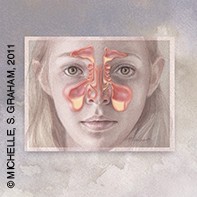Peer Reviewed
Feature Article Respiratory medicine
Treatment decisions in adult rhinosinusitis
Abstract
Adult rhinosinusitis is one of the most commonly diagnosed conditions in Australia and patients will often present to their GP for treatment. A thorough patient history is important for the diagnosis of acute and chronic rhinosinusitis, and for guiding appropriate medical therapy.
Key Points
- Acute and chronic rhinosinusitis are common disorders that can adversely affect patient quality of life.
- Most patients with mild acute rhinosinusitis can be treated expectantly using analgesics in conjunction with oxymetazoline hydrochloride or intranasal corticosteroids.
- Antibiotics are indicated in patients with severe acute rhinosinusitis or with mild acute rhinosinusitis not responding to treatment with nasal sprays.
- Chronic rhinosinusitis is treated with a protracted course of saline irrigations and intranasal corticosteroid therapy.
- Referral is indicated when severe acute and chronic rhinosinusitis do not respond to appropriate medical therapy, when acute rhinosinusitis is recurrent, and if the diagnosis is in doubt or complications are suspected.
- A sinus CT scan is recommended before referral, as patients may require functional endoscopic sinus surgery.
Purchase the PDF version of this article
Already a subscriber? Login here.

